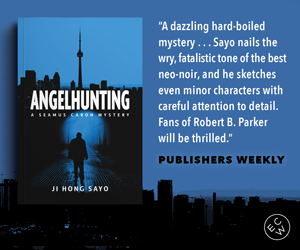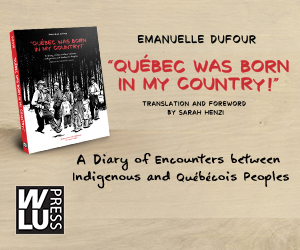"Poetry is a Polyamorous Party" Jessi MacEachern on Early Influences, a Poem a Day, & Why She Can't Name Just One Favourite
The women poets of Canada are some of the most innovative and fearless writers around, and Jessi MacEachern's debut full length collection, A Number of Stunning Attacks (Invisible Publishing), is more proof of that exciting fact.
MacEachern's finely honed technique and emotional smarts are beautifully displayed as she uses intimacy to disorient and fragmentation to connect, bringing the reader's focus both inward and outward at once. Fans of Lisa Roberston and Erín Moure will find lots to love in these pages.
We're excited to be chatting with Jessi today about how her literary life led her to A Number of Stunning Attacks, through our Poets in Profile series, where we ask poets about formative reads, their writing process, and more.
She tells us about the women writers whose "volcanic poetry" were counted among her early influences, her incredible poem-a-day project that you'll want to try your hand at, and why most of the poems she writes "may never work a day in their life" (and why that's okay).
OB:
What is the first poem you remember being affected by?
JM:
Strangely, I have a better memory of one of the first poems I wrote than I do of any of the first poems I must have read. It was a high school assignment and I wrote “an epic” from the perspective of a housefly. I am embarrassed to recall the pride I felt in the cleverness I had shown the teacher, who I felt certain was deeply impressed.
My next memory of poetry’s cleverness has to do with reading T.S. Eliot’s “The Love Song of J. Alfred Prufrock” in a first-year university class. I bristle a little now at what was then my immediate reverence for the cold male modernists (I bought tattered second-hand copies of the Selected Poems of both Eliot and Ezra Pound within the same year), but I’m happy to say it prepared me for being further overpowered by the volcanic poetry of women modernists such as H. D., Mina Loy, and Gertrude Stein.
OB:
What one poem—from any time period—do you wish you had been the one to write?
JM:
I wish I had the imaginative power and worlds-spanning knowledge to write the visionary trilogy Helen in Egypt by H. D. The late modernist epic contains the poet’s characteristically crystallised imagery, as well as the roiling expansiveness of a palimpsest collecting the accumulated mythologies of disparate ancient civilizations. It tells one hell of a story, while also challenging the reader’s certainty about the distinctions between love and death, sex and war.
OB:
Do you write poems individually and begin assembling collections from stand-alone pieces, or do you write with a view to putting together a collection from the beginning?
Your CanLit News
Subscribe to Open Book’s newsletter to get local book events, literary content, writing tips, and more in your inbox
JM:
I begin by writing individual poems. As recently as a year ago, it was the case that before an individual poem could take shape, an immense amount of other writing had to be done. I would spend days, weeks, or months scrawling out full pages or small snippets borrowed directly from what I was reading (novels, theory, poets’ prose) before selecting a certain arrangement I could make my own. Those words were suddenly new in being cleaved away from their original texts, but what was missing was a guiding thought or feeling. If it had existed once it had been forgotten in the process of selection, omission, and transformation.
Today, I am trying something new. As methods for writing go, it is not new at all; it requires only a notebook and a blank page. Each day, I write what feels like a poem or the beginning of a poem on a new page of my notebook. Its length is determined by the length of the page and each day I fill the page until it is bursting. It’s best if I do this in the morning, in bed in the moments before I have had the chance to make the coffee or grab my phone, and with another poet’s book in my lap. I do not necessarily have a view to putting together a collection with these poem-a-day beginnings but something is holding them together: time and the notebook, I suppose.
OB:
What do you do with a poem that just isn't working?
JM:
Very few of my poems are natural workers. They languish for years at a time in abandoned notebooks or digital folders, it can be difficult to nudge them into a productive pose. They form tight-knit cliques amongst themselves, or sometimes sprawling orgies, and it can be very difficult to know where one begins and the other ends. What I’m saying is that most of the poems I write may never work a day in their life, they’re happier that way. Time is a necessary partner, I won’t know which poem is ready to stand up and become itself until it has tried on several versions of itself. And even then, it takes some passing, indeterminable cry in the brain to say, Maybe that’s the one we write into being today.
OB:
What was the last book of poetry you read that really knocked your socks off?
JM:
I refuse to name just one; poetry is a polyamorous party. Last year, I was floored by my friend Jessie Jones’s debut poetry collection, The Fool (icehouse poetry, 2020). She gives words a heft I sincerely admire. Around the same time, I had the experience of nearly drowning in the pleasure of reading, while in the bath, Klara du Plessis’s Hell Light Flesh (Palimpsest Press, 2020). And now I’m just bragging about my friends, but I have the good fortune to know so many fine writers, so I’ll tell you I’ve also had the privilege of reading an early manuscript of Sarah Burgoyne’s Because the Sun (Coach House, 2021) and it’s already my favourite book of the year. Finally, I will mention two recent works that keep a question open in my mind: Erín Moure’s The Elements (Anansi, 2019) and Canisia Lubrin’s The Dyzgraphxst (McClelland & Stewart, 2020). The sharp intellect and delectable language of these poets gives me no rest, but it gives plenty else.
_____________________________________________________
Jessi MacEachern lives in Montréal, QC. Her poetry has been published in Poetry Is Dead, Vallum, MuseMedusa, Canthius, PRISM, and CV2. You can read her chapbook Ravishing the Sex Into the Hold online at MODEL PRESS. Her first full-length poetry collection is A Number of Stunning Attacks (Invisible Publishing, 2021). She is currently working as an Assistant Professor in the Department of English at Concordia University.




